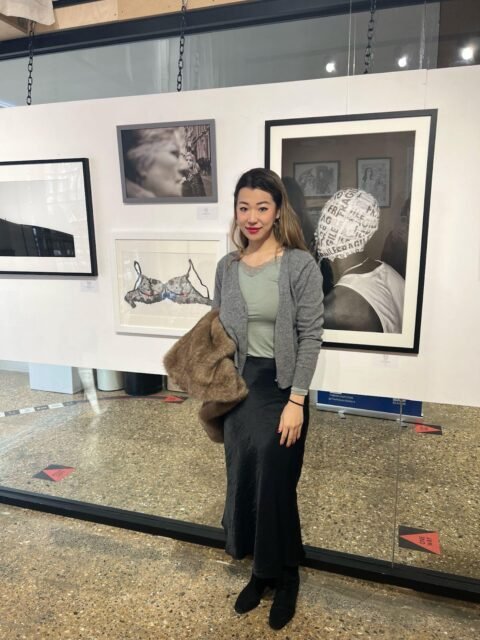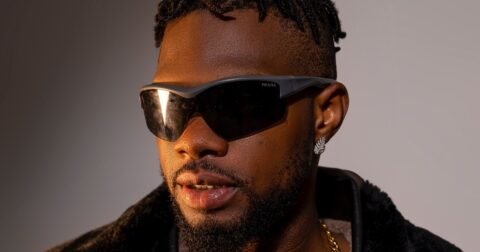“My spring-summer ’24 womenswear collection is about being in the moment, about being aware in every way—emotionally, politically, and artistically,” says Duro Olowu.
A glance at the collection feels like stepping into a 400-level class on intention in clothing. Swaths of shades and perfectly clashing patterns dance over tailoring as technically precise as it is fluid: Animal prints billow from the waist of a maxidress; pale yellow flowers are suspended on a kelly green suit, while tribal print decorates the pants.
“I tend to gravitate towards bold, vivid colors, but this collection also features delicate yet powerful pastels and prints that are at once familiar yet novel to the wearer. My understanding of color has always been instinctive. Each hue is a defining moment in the choice the wearer makes to reflect how they want to place themselves in the world,” he says.
Duro Olowu SS24 Look 02Luis Monteiro, Courtesy of Duro Olowu.
The Nigerian-born designer, who spent childhood summers in Geneva and came of age in Paris, studied law before launching his eponymous label in 2004; an early hit was the “Duro Dress” that debuted (and quickly sold out) at Barneys. Before Olowu had even staged a runway show, the British Fashion Awards dubbed him New Designer of the Year in 2005. The women of Olowu’s family, who always channeled power and prestige in their appearance, served as his first and greatest inspiration, and along the way, he’s garnered loyal fans, from Michelle Obama to Solange Knowles. The woman he designs for is “directional yet trend-free” and wears clothing that is “an ode to individuality and allure,” he says. Olowu resides in West London, showing his collection during London Fashion Week in an intimate presentation, and he doesn’t have a retail website—a radical opt-out in the digital age.
In his London store, Olowu’s collections live alongside antique African and European textiles, James Baldwin and Zadie Smith first editions, and a marvelous collection of contemporary works by artists like Stanley Whitney, Lynette Yiadom-Boakye, and Marcel Dzama. Indeed, his keen eye for arrangement extends to the art world.
Below, he shares his personal favorites with VF, from rare books to robes fit for a king.
Style File
DAILY UNIFORM: Cobalt green vintage French workwear jacket, Duro Olowu Menswear rayon and silk shirt, and Christopher Nemeth denim black stitch trousers.
TAILOR: John Pearse, Meard Street, London.
VINTAGE TREASURE: My large collection of antique West African textiles— particularly the embroidered Yoruba robes of my father and grandfather.
SHADES: Tom Ford.
NECKWEAR: Turnbull & Asser navy silk twill polka-dot scarf.
DRESS SHIRT: Custom Charvet.
SOCKS: Green or blue Uniqlo socks.
FOR WALKING: K.Jacques Homere handmade sandals.
Self-care
FACE WASH: Sisley Paris.
COLOGNE: Indelebile by Frédéric Malle.
SUNDAY RITUAL: Sleeping in.
TO UNWIND: Visiting museum and gallery art exhibitions wherever I may be. The “Women in Revolt!” show currently at Tate Britain in London is a triumph on many levels. Also fantastic, “Alaïa/Grès. Beyond Fashion” at Fondation Azzedine Alaïa in Paris.
At Home
RECENT ADDITION: Coffee table by Max Schmidt, circa 1905 Vienna from Two Poems in London.
SKETCHING: In notebooks I collect from around the world.
TO ILLUSTRATE: Faber-Castell graphite pencils and brush pens.
SEATING: Pierre Guariche/A.R.P. chair from Demisch Danant.
ON DISPLAY: Magdalene Odundo vessels.
For Pleasure
LOOKING AT: Portrait of Space, Near Siwa, Egypt, 1937 by Lee Miller.
READING: The Most Secret Memory of Men by Mohamed Mbougar Sarr and Out of Place: A Memoir by Edward Said.
DOING: Shopping for rare books. Tenderbooks or Kulik Selzer are my favorite bookshops in London.
WATCHING: Heremakono (Waiting for Happiness), directed by Abderrahmane Sissako, and La baie des anges (Bay of Angels), directed by Jacques Demy.
LISTENING TO: Rufus and Chaka Khan.
The Menu
COMFORT FOOD: Nigerian jollof rice with dodo.
DINNER RESERVATION: Maison François in London— served by the most professional and elegantly dressed staff.





